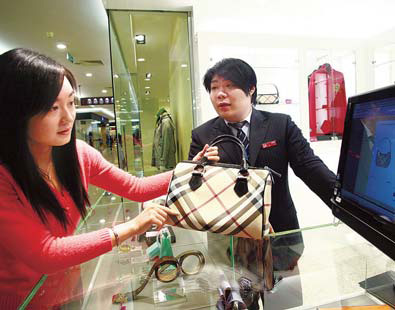Overseas online purchasing comes into fashion
|
|
|
A customer shops at a counter providing overseas purchasing services in Beijing Modern Plaza in this file photo taken in 2009. [China Daily] |
Attractive price and range of goods lure shoppers seeking a better deal, Gao Qihui reports in Beijing.
Jia Huiyi, a 27-year-old woman working in Beijing, explored a new way of shopping when she used an overseas purchasing service to buy a pair of popular UGG boots.
She paid 557 yuan ($85) for her boots from a Chinese Australian who runs an online store for Chinese mainland customers. The same boots in a franchised store on the mainland would have cost more than 2,000 yuan, Jia said.
Jia is one of millions who have been attracted by overseas purchasing services, most of which provide online agents. The primary attractions are price, selection and quality, including the safety aspect of some products. And the results are lucrative.
Use of the services by mainland customers via the Internet last year was worth 12 billion yuan ($1.8 billion), a 140-percent increase from 2009. The total is expected to double this year, said the Monitoring Report on the Data of China's E-commerce Market in 2010 by the China E-commerce Research Center (CERC).
Consumers can buy directly from other foreign websites, but Chinese mainland consumers rarely use them. Foreign online shops are unfamiliar to them. Plus there are language barriers, shipping restrictions and requirements that bank cards be set up for international use.
Brands from outside the Chinese mainland are the shoppers' primary targets because of big price differences between goods found in the mainland and other markets, including Hong Kong and Taiwan. That's why Jia chose to buy her boots from Australia, thousands of kilometers from China.
International brands often set high prices for goods sold on the Chinese mainland because people are willing to pay them, Zhu Mingxia, a professor at the University of International Business and Economics in Beijing, told China Daily for a previous report. But now, with overseas purchasing services, shoppers can get the same quality goods at lower prices.
They also have more to choose from. "Many products are not sold in the mainland and there are more styles in foreign stores," said Li Lei, 23 and a graduate student at Communication University of China in Beijing. "If the price is right, I will buy."
Supporting data come from Shi Yang, marketing manager of usashopcn.com, which specializes in overseas purchases. "Roughly 70 percent of all product categories provided by our website are not sold on the Chinese mainland." As one example, Shi said more than 60 percent of Coach handbags and accessories sold on her website aren't available on the mainland.
CERC's report shows that cosmetics and powdered milk, produced under higher safety requirements overseas, were the most popular products of online overseas purchasing services in 2010. They were followed in popularity by luggage and handbags, hats and shoes, clothing, and electronics.
Competition and taxes
The increasing popularity of overseas purchasing services has led to business opportunities for new agents - and, in its own way, China Customs.
A Web search for shops related to "US purchasing agent" at taobao.com, which is owned by Alibaba Group Holding Ltd and is China's largest e-commerce site, yields 3,937 shops. A search for "South Korea purchasing agents" yields 8,240 shops.
That means more and fiercer competition for the agents. "I opened my online shop more than half year ago, but I have not received any orders," said Zhao Qian, 21, who owns an overseas purchasing e-shop at taobao.
A regulation that China Customs introduced in September is adding price pressure for overseas purchasing agents, most of whom are individual operators.
The agents or their overseas partners mail most products to the Chinese mainland as personal articles to evade customs duties, essentially turning the transactions into a black market, said Fang Yingzhi, an analyst at CERC.
 0
0 








Go to Forum >>0 Comments